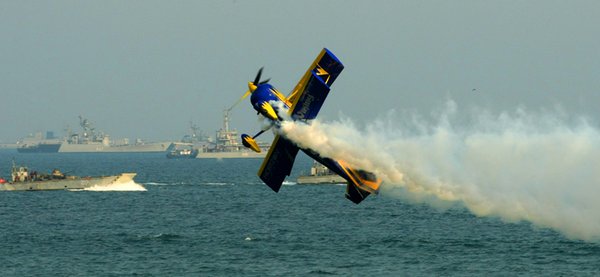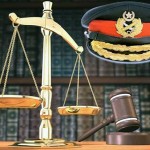IDR Blog
Recalling the 1st International Fleet Review: When PM Vajpayee's leadership stood out
Until the turn of the century, a Fleet Review by the President of India had always been deemed as a local affair, meant to be conducted in-house by the Indian Navy (IN). Even though IN warships had participated in various International Fleet Reviews in other countries, the idea of India conducting such an international event had never found favour. Perhaps, the massive scale of operational logistics required for such an endeavour may have been intimidating.
But in March 1999 it all changed. This happened when Prime Minister Atal Bihari Vajpayee was embarked for two days on board our aircraft carrier INS Viraat. Visibly impressed by our fleet operations at sea, the Prime Minister asked a searching question: How do navies operating in international waters keep their distance? And then added – after a long pause – in his characteristic manner: ‘kya kuch dosti ho sakta hai? (Can there be friendship (on sea)?’
Prime Minister Vajpayee, a former Foreign Minister, had an intuitive and astute understanding of the nuances of sea power, which forms the essence of maritime diplomacy. And with that remark and subsequent discussions germinated the idea of conducting India’s first International Fleet Review (IFR).
A few months later, this idea received definitive impetus when the Kargil War erupted in May 1999. While the Indian Army and Indian Air Force prepared to evict the Pakistani intruders along the Himalayan frontier, the Indian Navy rapidly deployed both fleets for action and swiftly seized the initiative seaward. This effectively prevented escalation of the conflict.
In hindsight, the events of Kargil clearly cemented the need to portray the Indian Navy as a stabilising force in the region. Conducting the First IFR thus became a time-bound mission for the Vajpayee government and BRIDGES of FRIENDSHIP became the theme for the first IFR.
But conducting an IFR,and that too for the first time, was going to be a daunting task. So the IN set itself a two-year time frame with February 2001 as the target date.
With the understanding and support of Prime Minister Vajpayee and then Defence Minister George Fernandes, everything fell into place. But what gave me great confidence as the Navy Chief was the enthusiasm and initiative of my three Commanders in Chiefs: Vice Admirals Madhvendra Singh, Vinod Pasricha and Ravi Ganesh.
As one looks back a decade and half ago, one can say with satisfaction that our very first IFR certainly had a seminal character. It was also distinctive in many ways. Not only was it the first international event conducted by India in the new millennium but it reflected the many sinews of India’s prowess, both technological and military. Moreover, the participation of 29 foreign navies along with the Indian Navy gave it a very special flavour.
While India’s first IFR was certainly a defining moment in our history, it was not without its hiccups and anxious moments.
A few days before the IFR was scheduled in Mumbai, a massive earthquake rocked the adjacent state of Gujarat on January 26. The trauma that followed this major disaster cast a dark shadow on the impending IFR. But the grit and statesmanship of Prime Minister Vajpayee came forth when he gave Defence Minister George Fernandes his considered decision – the IFR must go on.
And so it did – with aplomb.
The arrival of foreign warships was a resplendent sight for Mumbaikars. Dressed in full regalia these foreign men of war entered Mumbai harbour exchanging gun salutes. But they came laden with medical supplies and rescue material for the victims of the Gujarat earthquake. It was a heart-warming gesture. This was what Bridges of Friendship was all about.
Navies worldwide have always had a professional understanding among themselves. This is what gives an International Fleet Review a unique grandeur of its own. Yet in a certain way, an IFR also provides a litmus test for international relations. In that respect, while it was evident that Pakistan would not be represented, it was disappointing that China was unable to participate in our first IFR.
There is much that we learnt from our first IFR in 2001. Being all about maritime diplomacy, the navy had to work hand in hand with the Ministry of External Affairs. Nominated as the Flag Officer Fleet Review (FOFR), Rear Admiral Suresh Bangara provided that crucial link for the IN. On the eve of this major event, he appeared crestfallen. We seemed to have been caught in a diplomatic tangle.
It turned out that the ambassador of a participating foreign navy had insisted that he outranked his navy chief in protocol and staked his claim to be positioned atop the presidential yacht.
Jaswant Singh was the Foreign Minister and, in his own inimitable style, resolved this diplomatic hiccup. The ambassador was quick to realise his faux pas for he could find himself embarrassingly out of place amidst a host of ceremonially attired admirals who were part of the international navy parade.
The Indian Navy has certainly come of age and expectations run high as we eagerly look forward to India’s second IFR at Vishakhapatnam. Our best wishes are with the IN’s Gen Next.
Courtesy: http://southasiamonitor.org/detail.php?type=in&nid=15502





